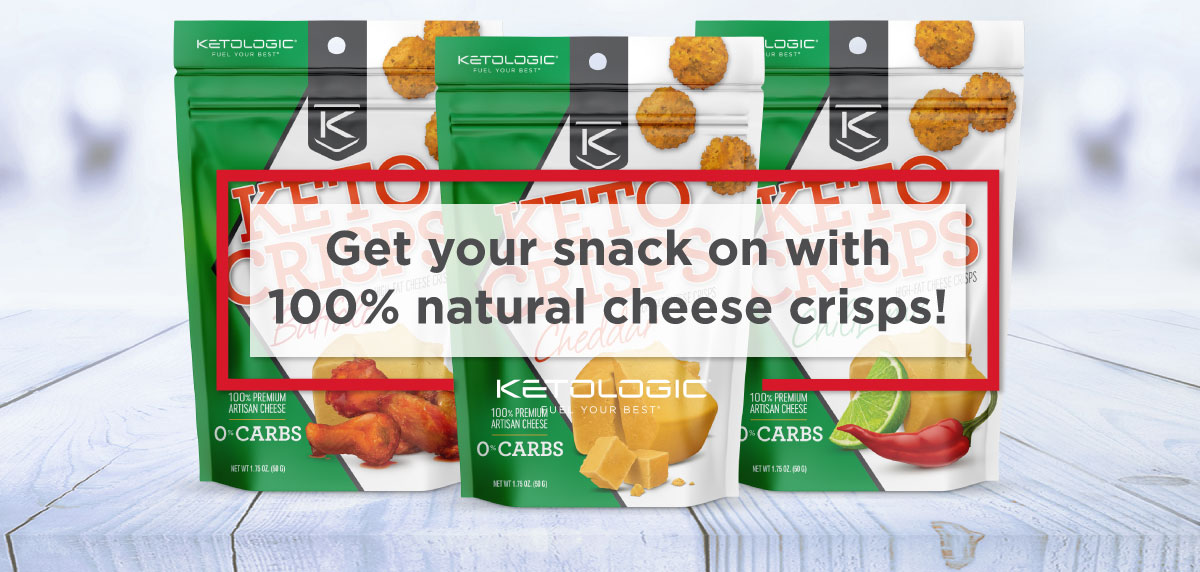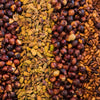Avocados are amazing. If we could only have one food on a desert island, it would be a close call between avocados and bacon. We love them both so much. But it’s not just the way they taste - avocados are packed with nutrients your body will love.
And of course they are at the top list when it comes to our Master Keto Food List with 100+ keto foods mapped out.
Here’s our list of the top 10 reasons avocados are the greatest:
- Great source of high-quality fats
Avocados are full of monounsaturated fatty acids, particularly oleic acid, a heart-healthy omega-3 fatty acid also found in olive oil [
1]. As well as being used for energy, omega-3 fatty acids help lower elevated blood levels of triglycerides, which can cause heart disease. They also help lower LDL (“bad”) cholesterol [
1,
2]. Three cheers for healthy fats!
- Vitamins, vitamins, and more vitamins
Along with healthy fats, avocados are packed with vitamins C (22% DV), E (28% DV), K (18% DV), Folate (20% DV), Niacin (11% DV), and B6 (15% DV) [
3,
4]. They also contain smaller amounts of vitamin A (2% DV) and Riboflavin (10% DV) [
3,
4]. That’s a lot of goodness in one fruit.
- Helps you absorb nutrients
Eating lots of key nutrients is great, but in order to get their full benefits, your body has to properly absorb them. Fat-soluble nutrients like vitamins A, D, E, and K are more easily absorbed into the bloodstream when paired with a healthy fat [
5]. Avocados supply many of these vitamins and healthy fats. Talk about multi-tasking!
- More potassium than bananas
It might be hard to believe, but there’s more potassium in 100g of avocado (485mg) than 100g of banana (358mg) [
3,
6]. Potassium helps maintain healthy blood pressure, cardiovascular health, and bone and muscle strength.
- Supports bone health
Along with potassium, avocados contain magnesium, which also supports bone health. Studies have shown that magnesium also supports heart health, and may lower the risk of diabetes [
7].
- Full of fiber
100g of avocado has 7g of fiber, which is 28% of the recommended daily value. Not only does fiber improve digestion and promotes gastrointestinal health, it also helps satiate hunger. Who would say no to eating less and still feeling full? As a bonus, fiber helps prevent cardiovascular disease and lowers LDL cholesterol [
3,
8].
- Easy to add to (almost) any meal
There was a time when avocados were reserved just for
guacamole, but now there’s a new avocado trend every other week. From
toast to
gelato, there’s a seemingly endless number of ways to incorporate avocado into almost any diet.
- Enhances eye health
Avocados contain beta-carotene, which the body uses to make vitamin A. Vitamin A helps the brain process light and supports the cornea in the eye [
9]. Avocados also contain lutein, which is thought to prevent cataracts and age-related macular degeneration (AMD) [
10].
- Supports healthy babies
Avocados contain folate, which helps reduce the risk of miscarriage and birth defects. Folate helps the development of the fetus in early pregnancy, particularly the neural tube [
11].
- May protect against cancer
Avocados contain many carotenoids, including alpha and beta carotene, lutein, and zeaxanthin. Carotenoids, along with other nutrients found in avocados, are thought to help prevent stomach, prostate, and oral cancer [
12,
13,
14].
Conclusion
No matter how you slice it or dice it, it's safe to say that avocados should be a part of your diet. As a low-carb, high-fat food, there's a reason why those on the keto diet love avocados.
***
In addition to our guacamole recipe, we have many more keto-friendly recipes cooks of all levels can make!
For other keto diet essentials, check out our Keto Essentials Food List.
If you're considering the keto diet, learn about the Pros and Cons of the Keto Diet.
Ready to embark on your keto journey? Here are the Top 10 Things You Need to Know Before Going Keto.
Want to boost ketone production and enhance weight loss, try KetoLogic® KetoMeal®, BHB, and Coffee Creamer!

REFERENCES
[1] https://www.healthline.com/nutrition/12-proven-benefits-of-avocado
[2] https://www.medicinenet.com/omega-3_fatty_acids/article.htm#what_foods_are_rich_in_omega-3_fatty_acids
[3] https://ndb.nal.usda.gov/ndb/foods/show/09037?fgcd=&manu=&format=&count=&max=25&offset=&sort=default&order=asc&qlookup=09037&ds=&qt=&qp=&qa=&qn=&q=&ing=
[4] https://www.dsld.nlm.nih.gov/dsld/dailyvalue.jsp
[5] https://www.healthline.com/nutrition/12-proven-benefits-of-avocado#section7
[6] https://ndb.nal.usda.gov/ndb/foods/show/09040?fgcd=&manu=&format=&count=&max=25&offset=&sort=default&order=asc&qlookup=09040&ds=&qt=&qp=&qa=&qn=&q=&ing=
[7] https://www.webmd.com/diet/supplement-guide-magnesium#1
[8] https://www.medicalnewstoday.com/articles/146935.php
[9] https://www.allaboutvision.com/nutrition/vitamin_a.htm
[10] https://www.webmd.com/vitamins/ai/ingredientmono-754/lutein
[11] https://www.babycenter.com/0_folic-acid-why-you-need-it-before-and-during-pregnancy_476.bc
[12] https://www.pcrm.org/health/cancer-resources/diet-cancer/nutrition/how-carotenoids-help-protect-against-cancer
[13] https://www.ncbi.nlm.nih.gov/pubmed/11237205
[14] https://www.ncbi.nlm.nih.gov/pubmed/17284749






